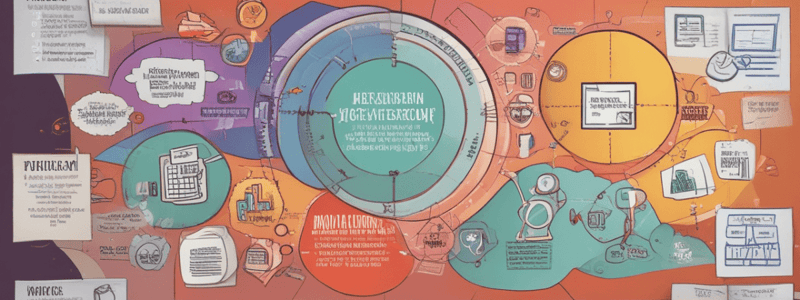Podcast
Questions and Answers
Which of the following organizational theories focuses on optimizing tasks and work processes to increase efficiency?
Which of the following organizational theories focuses on optimizing tasks and work processes to increase efficiency?
- Systems Theory
- Scientific Management (correct)
- Behavioral Approach
- Administrative Theory
What is a key characteristic of the Bureaucratic Theory?
What is a key characteristic of the Bureaucratic Theory?
- Formal hierarchical structure with clear rules and procedures (correct)
- Importance of social factors
- Emphasis on human behavior
- Division of work and authority
Which of the following is NOT a focus of Classical Organizational Theory?
Which of the following is NOT a focus of Classical Organizational Theory?
- Human and social aspects (correct)
- Formal organizational structure
- Standardized tasks
- Efficiency and productivity
Who is associated with the Human Relations Movement?
Who is associated with the Human Relations Movement?
What is the main focus of Modern Organizational Theory?
What is the main focus of Modern Organizational Theory?
What is a key characteristic of the Administrative Theory?
What is a key characteristic of the Administrative Theory?
Which of the following is a key concept in Systems Theory?
Which of the following is a key concept in Systems Theory?
What is a key difference between Classical and Neoclassical Organizational Theories?
What is a key difference between Classical and Neoclassical Organizational Theories?
Which of the following is NOT a key characteristic of Open Systems Theory?
Which of the following is NOT a key characteristic of Open Systems Theory?
According to Contingency Theory, what is the primary determinant of organizational effectiveness?
According to Contingency Theory, what is the primary determinant of organizational effectiveness?
Which organizational theory highlights the importance of understanding and responding to external environmental factors?
Which organizational theory highlights the importance of understanding and responding to external environmental factors?
Which of the following is a key concept associated with Sociotechnical Systems?
Which of the following is a key concept associated with Sociotechnical Systems?
Which theory suggests that organizational effectiveness is contingent on the alignment between the organization's structure and its environment?
Which theory suggests that organizational effectiveness is contingent on the alignment between the organization's structure and its environment?
Which organizational theory rejects the notion of a universal best way to organize or manage?
Which organizational theory rejects the notion of a universal best way to organize or manage?
What is the main focus of the Input-Throughput-Output Model?
What is the main focus of the Input-Throughput-Output Model?
Which organizational theory emphasizes human and social factors in the workplace?
Which organizational theory emphasizes human and social factors in the workplace?
Which of the following is NOT a key characteristic of Contingency Theory?
Which of the following is NOT a key characteristic of Contingency Theory?
Which of the following theories emphasizes the importance of continuous improvement and adaptation?
Which of the following theories emphasizes the importance of continuous improvement and adaptation?
Flashcards are hidden until you start studying
Study Notes
Classical Organizational Theory
- Aims for efficiency, productivity, and a formal structure within organizations.
- Scientific Management (Frederick Taylor):
- Focuses on task optimization and work process efficiency through time and motion studies.
- Administrative Theory (Henri Fayol):
- Introduces management principles such as division of work, authority, unity of command, and esprit de corps.
- Bureaucratic Theory (Max Weber):
- Advocates for a formal hierarchical structure with defined rules and procedures, highlighting rational-legal authority.
Neoclassical Organizational Theory
- Focuses on human and social dimensions within organizations, emphasizing the role of human behavior.
- Human Relations Movement (Elton Mayo, Hawthorne Studies):
- Stresses social factors and employee well-being, suggesting that satisfaction and relationships enhance productivity.
- Behavioral Approach:
- Concentrates on motivation, group dynamics, and effective communication as vital for improving employee morale.
Modern Organizational Theory
- Encourages complex and flexible approaches to organization and management.
- Systems Theory:
- Considers organizations as interrelated components that together form a complex system.
- Sociotechnical Systems:
- Looks at both social and technical interactions within organizations, promoting optimal work system design.
- Contingency Theory:
- Highlights that effective management strategies depend on specific internal and external circumstances.
Open Systems Theory
- Positions organizations as open systems that engage with their environment and rely on external resources.
- Environmental Interaction:
- Underlines the necessity for organizations to adapt to external changes for survival.
- Input-Throughput-Output Model:
- Describes organizational processes transforming inputs into outputs, stressing the importance of feedback for improvement.
- Dynamic Equilibrium:
- Advocates for a balance between internal stability and external adaptability for organizational success.
Contingency Theory
- Asserts that organizational effectiveness hinges on alignment with environmental conditions.
- Situational Variables:
- Identifies how factors like technology, environment, and size influence management and organizational structure.
- Fit and Alignment:
- Emphasizes adapting organizational structure and strategy to meet specific situational needs for successful interaction with their environment.
- No One Best Way:
- Rejects the idea of a universal optimal management approach, promoting flexibility based on contextual factors.
Summary
- Classical theory prioritizes efficiency and formal structures.
- Neoclassical theory incorporates human and social considerations.
- Modern theory encompasses complexity and flexibility, integrating systems thinking.
- Open systems theory emphasizes continuous interaction with the environment.
- Contingency theory focuses on adaptation and alignment with varying contexts.
Studying That Suits You
Use AI to generate personalized quizzes and flashcards to suit your learning preferences.



